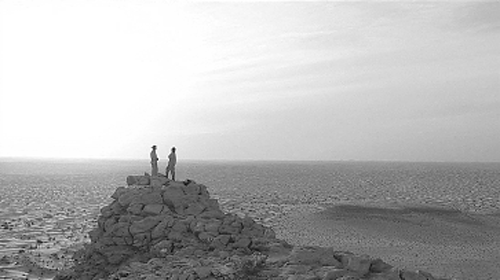But will anything have changed when his visit is over?
Desert Wind: What Men Talk About In the Desert
Directed and written by Francois Kohler
In French with English subtitles
National Film Board of Canada
Opens Feb. 15
Film Forum
A scene from François Kohler’s documentary “Desert Wind,” which follows a group of men on a 12-day trek in the Tunisian desert, where a psychologist encourages them to rethink their lives and their male identity.
“Desert Wind” follows 13 men ages 32 through 70, from a variety of French-speaking countries, on a trip through the Tunisian part of the Sahara Desert. They are all strangers before embarking on this trip into their psyches, led by Swiss psychologist Alexis Berger.
Straight men are famous for not discussing their personal feelings, so it’s no surprise that the only way to encourage this might mean isolating them in the Sahara with no escape routes. Guided by Berger, they engage in some symbolic rituals, like discarding fears by burning them in a communal fire, or showing aggression without resorting to violence by wrestling one-on-one.
To some degree, a lot of this seems like the kind of 1970s self-awareness exercise criticized by Wallace Shawn in “My Dinner with Andre.” Most working people don’t have the time to spend a fortnight wandering the desert and opening up old wounds. The film’s premise also seems like yet another reality TV show set up; at times, that’s how it feels. The men are heard in voiceover while the camera follows them around the desert, as they reminisce about distant mothers, weak fathers, and other influences.
A lot of the men’s stories sound similar to one another. One man discusses being embarrassed by a scrawny, unathletic father who died too early. Another man remembers how Grandma made him her favorite and turned him against his parents. One man blames his mother for his current inability to be sexually intimate with his wife, while another says he somehow transformed his wife into the overbearing image of his mother. The uniting factor seems to be that for better or worse, these men are the products of their imperfect parents’ unions; some of the men observe that they are more like their parents than they ever anticipated they would be.
Unlike reality-show contestants, these men really open up about their pasts. They are not split up into teams and set up to compete—stripping naked in front of a dozen strangers and discussing their bodies is daunting enough. This particular exercise brings up a little of the men’s innate homophobia, as one participant observes, “This is the first time I have allowed myself to look at men’s genitals without feeling it is bad.” Another man admits that he enjoyed a certain amount of pleasure when he had a man tattoo him on a sensitive part of his body.
During these moments, the Arab guides completely vanish from view. It’s hard to imagine that they would relate to any of this kind of new-age stuff. This combination of introspection and exhibitionism might be familiar ground for a lot of gay men, but the film makes it pretty clear that the average straight man is not doing this sort of thing on the weekends.
The desert surroundings show how bound to civilization most of us are. One man has packed everything in plastic bags to protect everything from the sand, and has a special brush to dust off his new glasses before cleaning them, so they can stay nice for the return home. This sort of fussiness stands out among the dunes, and the sight of a man pulling wheeled luggage through the sands is absurd and hilarious too.
This baker’s dozen seem to gain new awareness that they can be men on their own terms, and not be defined by society. There is a lot of self-determination here to let go of the past, with scenes of some of the men yelling, “I am a free man” into the desert sky and writing letters to dead parents, confronting old wounds. And the group also develops a fond kinship. The one thing we don’t learn is how much of this new power they will actually use once they return to all the familiar pressures and influences.
gaycitynews.com


































